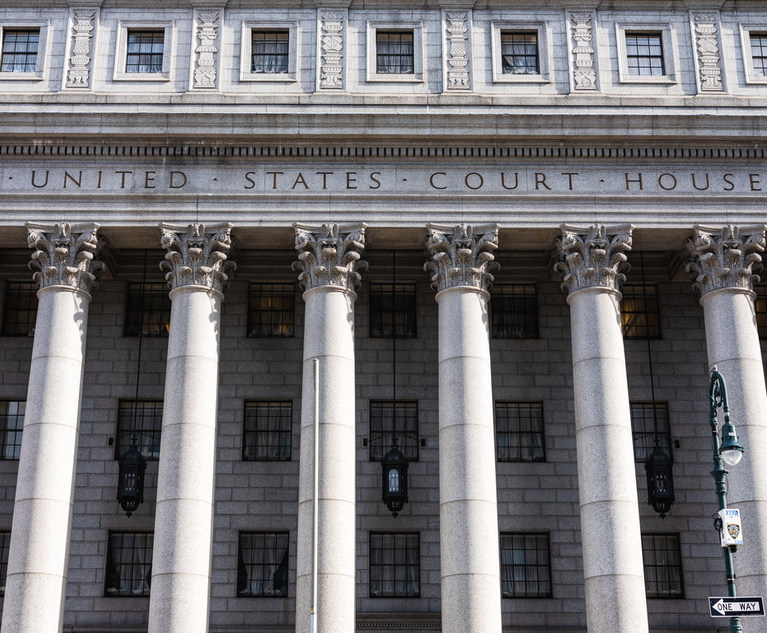Jonathan Sack

July 05, 2022 | New York Law Journal
Belt and Suspenders? DOJ Adds New Certification Requirement to Corporate Plea AgreementsThe DOJ's certification requirement amounts to a hybrid of corporate and individual responsibility.
By Elkan Abramowitz and Jonathan Sack
10 minute read

May 04, 2022 | New York Law Journal
Jury Rejects Wire Fraud Charges in Boeing Crash ProsecutionThe acquittal of Mark Forkner, a former Boeing test pilot, this past March highlights the risks of making the prosecution of individuals a priority.
By Elkan Abramowitz and Jonathan Sack
10 minute read

March 03, 2022 | New York Law Journal
Bad Intentions Are Not Enough: Second Circuit Reverses LIBOR Convictions in 'U.S. v. Connolly'In this edition of their White-Collar Crime column, Elkan Abramowitz and Jonathan Sack first summarize the facts underlying the 'Connolly' prosecution and then describe the detailed reasoning of the Second Circuit. They conclude by touching on several important takeaways from the holding—above all, that the decision draws attention to the limits of the mail/wire fraud statutes.
By Elkan Abramowitz and Jonathan Sack
11 minute read

May 27, 2020 | New York Law Journal
Limiting Victims' Rights: Eleventh Circuit Reads CVRA NarrowlyIn their White Collar Crime column, Elkan Abramowitz and Jonathan Sack summarize the facts and district court proceedings, and possible impact of 'In re Wild', which held that federal prosecutors did not have an obligation under the Crime Victims' Rights Act (CVRA), to tell Jeffrey Epstein's victims of the decision not to prosecute Epstein for sex trafficking.
By Elkan Abramowitz and Jonathan Sack
12 minute read

March 02, 2020 | New York Law Journal
The Importance of 'Particulars' in Criminal Fraud CasesIn their White-Collar Crime column, Elkan Abramowitz and Jonathan Sack discuss the standard for ordering a bill of particulars in the Second Circuit, drawing a comparison with the standard for civil fraud claims. They then describe a recent decision that highlights the importance of seeking bills of particulars in fraud cases.
By Elkan Abramowitz and Jonathan Sack
11 minute read

July 09, 2019 | New York Law Journal
Judicial Review of Claims of Government Misconduct in Parallel InvestigationsIn their White-Collar Crime column, Elkan Abramowitz and Jonathan Sack discuss the basic limitations on federal prosecutors when they conduct criminal investigations at the same time as related civil enforcement investigations. They also analyze a recent decision that illustrates the importance of being sensitive to possible government overreach during parallel civil and criminal investigations, and of advancing constitutional arguments when appropriate to protect a defendant's rights.
By Elkan Abramowitz and Jonathan Sack
11 minute read

May 06, 2019 | New York Law Journal
Hub, Spokes and Rim: Revisiting 'Kotteakos'In their White-Collar Crime column, Elkan Abramowitz and Jonathan Sack discuss the college admissions scandal in the context of "Kotteakos v. United States," which held that a conspiracy requires interdependence among its members.
By Elkan Abramowitz and Jonathan Sack
11 minute read

March 20, 2018 | New York Law Journal
'Menendez' Decision Clarifies Issues in Public Corruption CasesIn their White-Collar Crime column, Elkan Abramowitz and Jonathan Sack discuss the prosecution of U.S. Senator Robert Menendez and co-defendant Dr. Salomon Melgen, who were charged in the District of New Jersey with bribery, honest services fraud and related offenses.
By Elkan Abramowitz and Jonathan Sack
12 minute read

January 03, 2018 | New York Law Journal
Recent Developments in the Prosecution of CorporationsWhite-Collar Crime columnists Elkan Abramowitz and Jonathan Sack write: A program like the FCPA Corporate Enforcement Policy or a deal like the Aegerion Pharmaceuticals C Plea, while in many ways of great benefit, only decrease incentives to challenge the government. For the foreseeable future, the present system, concentrating great power with prosecutors, is here to stay.
By Elkan Abramowitz and Jonathan Sack
12 minute read

November 06, 2017 | New York Law Journal
Limits on the Scope of Honest Services FraudIn their White-Collar Crime column, Elkan Abramowitz and Jonathan Sack discuss the recent 'McDonnell' decision, particularly the effort of the Supreme Court to articulate limits on the reach of honest services fraud liability, and application of the decision in 2017 to several high-profile prosecutions of former high-ranking New York State politicians in the Second Circuit.
By Elkan Abramowitz and Jonathan Sack
26 minute read
Trending Stories
- 1How I Made Practice Group Chair: 'Think About Why You Want the Role, Because It Is Not an Easy Job,' Says Aaron Rubin of Morrison Foerster
- 2People in the News—Nov. 22, 2024—Marshall Dennehey, Buchanan Ingersoll
- 3$83M Verdict After $100K Demand Rejected in Henry County
- 4Samsung Flooded With Galaxy Product Patent Lawsuits in Texas Federal Court
- 5How Marsh McLennan's Small But Mighty Legal Innovation Team Builds Solutions That Bring Joy
More from ALM
- Legal Speak at General Counsel Conference East 2024: Match Group's Katie Dugan & Herrick's Carol Goodman 1 minute read
- Legal Speak at General Counsel Conference East 2024: Eric Wall, Executive VP, Syllo 1 minute read
- Legal Speak at General Counsel Conference East 2024: Virginia Griffith, Director of Business Development at OutsideGC 1 minute read



